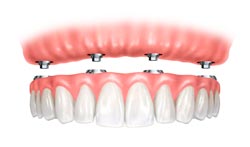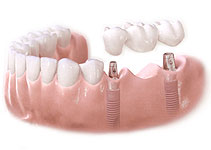What are dental implants?
Used when replacing an entire missing tooth, dental implants are titanium screws that are inserted into the jawbone, to which crowns or a bridge can be attached once the surrounding tissue heals.
Designed to look and function in a similar way to natural teeth, implants are an excellent solution where there is not enough anchoring teeth for bridges, or when a denture cannot be worn.
Titanium is an ideal implant material as it is strong, bio-compatible with living bone and muscle tissue, and most importantly, able to fuse with bone, creating a solid stable structure to cope with the pressures of eating and chewing.

Dental implants are fixed in place, so they won’t move, click or shift, giving you confidence in your smile. They can replace a single tooth, or replace a full set of teeth also known as ALL-On-4.
All-On-4 implants are a great alternative to dentures. Dentures may slip when eating, talking or even laughing which can be rather embarrassing. However, because dental implants last for years and year, it is important to choose the right option tailored to suit your needs.
Dr Karn is able to go through treatment plan options available on the day of your consultation.
Any surgical or invasive procedure carries risks. Before proceeding, you should seek a second opinion from an appropriately qualified health practitioner.
Types of Teeth Implants
Single Tooth Dental Implants
 Dental implants are an option often recommended for people seeking treatment options for a single/multiple missing teeth or alternatives to loose-fitting dentures. Dental implants are made out of a high-grade medical titanium screw-like ‘artificial root’ which is carefully and precisely inserted into the jawbone at a single tooth replacement
Dental implants are an option often recommended for people seeking treatment options for a single/multiple missing teeth or alternatives to loose-fitting dentures. Dental implants are made out of a high-grade medical titanium screw-like ‘artificial root’ which is carefully and precisely inserted into the jawbone at a single tooth replacement
All-On-4™ Dental Implants
 If replacing all top or bottom teeth our highly skilled dentist Dr Renu Karn may recommend 4 implants to support a full arch of teeth with this technique called All-On-4™.
If replacing all top or bottom teeth our highly skilled dentist Dr Renu Karn may recommend 4 implants to support a full arch of teeth with this technique called All-On-4™.
Am I a suitable Dental Implant candidate?

Patients with adequate bone structure and without a serious medical conditions can be suitable candidates for dental implants; however
there may be some situations where we will need to recommend other tooth replacement options. Special X-rays help us determine and diagnose the density of your bone as well as other surrounding structures used to determine if you are suitable.
To find out more about dental implants and how they may help you, please contact Dental Excellence for a detailed consultation and assessment.
Dental Implant Treatment stages
Placing the Implant
The implant procedure is conducted under a local anaesthetic, with many patients reporting very little or no discomfort. Requiring only a minor opening in the gum-line, your implant is then guided gently into position.
Healing and recovery
Following the implant placement, you’ll undergo a sequence of appointments to construct your prosthetic tooth replacement. During this phase your healing will be monitored carefully and you’ll have a temporary tooth option in place. Once your implant treatment is complete and your final restoration is connected, you will be able to relax, knowing that your new tooth is stable, secure and reliable.
Placing the crown or bridge
Following your implant procedure it is important to remember that maintaining your oral health is essential. Even though your implant is titanium and your replacement teeth are produced from high quality porcelain, your surrounding teeth and gums are still prone to the effects of gum disease.

Single tooth implant
and crown restoration

Multiple unit implants
with bridge preparation

Multiple unit implant
bridge restoration
Dental Implants FAQs
No dental solution can be guaranteed to last forever, but implants are created to provide a durable, long-term replacement for missing teeth. The titanium post used in the procedure bonds naturally with the jawbone, giving strength and stability that traditional dentures cannot offer. With good oral hygiene and regular check-ups, implant-supported crowns can remain functional and attractive for many years, often lasting decades.
For most patients, dental implants are placed using local anaesthetic, which keeps you comfortable while the area being treated is numbed. This means you are awake throughout the procedure but should not feel pain. General anesthetic, where you are fully asleep, is only recommended for more complex treatments, such as multiple implants or when additional procedures are required. At Dental Excellence, we carefully assess your medical history and needs to ensure the safest and most comfortable anaesthetic option is chosen for you.
The time required for dental implant surgery will depend on how many implants are being placed. In most cases, placing a single implant takes around one to two hours from start to finish. If you are considering an All-On-4™ treatment, the streamlined approach can help shorten the overall treatment process by avoiding lengthy bone grafting. Our team will provide you with a detailed treatment plan so you know what to expect at each stage, including healing time and follow-up visits.
Older patients can often enjoy the benefits of dental implants just as much as younger ones. Age itself does not prevent treatment, as long as general health and bone quality are suitable. Before beginning, we carry out thorough assessments to check gum health, bone density, and any medical considerations. Our focus is always on providing safe and individualised care tailored to your circumstances.
Several factors play an important role in how successful dental implants will be:
- Bone and gum health: A strong, healthy jawbone and gums support long-term stability.
- Oral hygiene and lifestyle: Regular cleaning and avoiding habits like smoking improve outcomes. Conditions such as diabetes can also influence healing.
- General health and medications: Certain health issues or medications that affect bone or immune function may impact the success of treatment.
- Placement and function: Correct positioning of the implant and ensuring even bite force reduces strain and helps prevent problems in the future.

